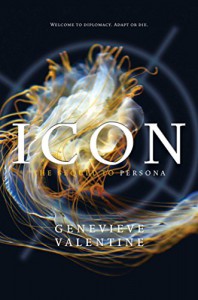By Singing Light
Pretty much everything here originally appeared at my actual blog: By Singing Light. I particularly focus on upper middle-grade and young adult books. I also enjoy adult genre books, especially speculative fiction.
Currently reading
Icon by Genevieve Valentine

(Orthodox readers, this is not an Orthodox book, despite the title! I’ll talk about this a bit more below but I wanted to make it clear right away.) (Everyone: There are spoilers for Icon below. I couldn’t talk about what I wanted to in this book without spoiling it, I’m sorry, please don’t read any more if this bothers you!)
Oh, friends. This book. However this review turns out, please understand that the temptation to just add that Community “MY EMOTIONS” gif and hit schedule is going to be super high. Genevieve Valentine is really good at making me feel lots of things, it turns out. Also, she writes books that I possibly would not read from anyone else but which are so good that I consider her an auto-read author at this point. I’m pretty sure she could imbue the phone book with strong characters and a tense plot, also that I would like it.
In this case, Icon is a sequel to last year’s Persona. Both are near-future political thrillers, about the same main characters, Suyana and Daniel. I finished Persona and was astonished that both of them made it out of the book alive.
Well, they don’t both make it out of Icon alive.
Icon has a sense of narrative inevitability from page one, and a sense of tension and doom that increases to an almost unbearable extent over the course of the book. I both knew and felt that things were gong to end badly. I kept finding myself holding my breath until the most immediate danger had passed. And yet, I kept reading, even knowing I was going to cry.
I cried so much.
Suyana and Daniel are completely compelling, partly because Valentine has a keen sense for what to tell us and what to leave out. Asking the reader to fill in the blank spaces makes us more invested, keeps us caring, keeps us turning the page. In Persona, we had a sense of them as unlikely partners. Here they’re separated. But they keep fighting and fighting, for the soul of the IA, for the people they care about, for each other. They never get a break or a rest, they hardly have a single moment alone together, and yet their relationship is so potent that it becomes the center around which the story turns.
(I also love that Suyana gets to be calculating without being heartless.)
But Valentine is also excellent at throwing her characters into tense, impossible situations. In Girls at the Kingfisher Club and Persona, they manage to win some sort of space, peace, love. Icon, on the other hand, refuses any way out. I have always thought that West Side Story is more tragic than Romeo and Juliet, because one of them lives and has to go on living. In Icon, not only does Daniel die, and in dying save them, but Suyana “wins” at a horrific personal cost. She ends the book almost entirely alone, muddied by politics. She has done the right thing for the IA and therefore the world. It’s not exactly a bleak ending. But it is a hard one.
Now, I do have to say that I’m not a fan of the title. I understand what Valentine is trying to conjure–the complexity boiled down into a symbol. But since I am Orthodox and the word icon has a primarily religious connotation for me, and since that religious understanding is quite different than Valentine’s usage, it just…doesn’t work for me. I realize this is a personal issue, and one not every reader will share.
I’d recommend this book for people at the unlikely intersection of: invested in Hiddleswift (I have not even gotten into Suyana’s fake relationship with Ethan!), interested in politics, and the red carpet, and into Code Name Verity. (Weirdly enough, I feel like I know multiple people who fit that profile.) Actually, you don’t have to be interested in all of those things, or maybe even any of them. You just have to be willing to let these characters in and then let them break your heart a little.












